20
Deputy prime minister Addisu Leggese’s embarrassing visit to the statesAugust, 2006 - In August of 2006, deputy prime minister of Ethiopia, Addisu Legesse, visited the United States in an effort to garner support for the government of Ethiopia by wining some converts over from the Ethiopian diaspora.
 But upon arrival, the deputy prime minister was met with fierce opposition; In no uncertain terms, the Diaspora community demanded the release of jailed opposition leaders - and made it clear that if any dialog is to commence between the opposition and current government; it is to be in the presence of the elected Kinijit (popular opposition party) MPs currently detained in the notorious Kality prison.
But upon arrival, the deputy prime minister was met with fierce opposition; In no uncertain terms, the Diaspora community demanded the release of jailed opposition leaders - and made it clear that if any dialog is to commence between the opposition and current government; it is to be in the presence of the elected Kinijit (popular opposition party) MPs currently detained in the notorious Kality prison.In the end the Deputy Prime minister was forced to cut his unsuccessful trip short and return to Addis Ababa.
19
Ethiopian refuges stranded in Lebanon – IOM to the rescue July, 2006 - As Israel intensified its relentless bombardment of Lebanon, destroying the headquarters of Hezbollah and pounding the country's ports: Ethiopians living in Lebanon were caught in the middle.
July, 2006 - As Israel intensified its relentless bombardment of Lebanon, destroying the headquarters of Hezbollah and pounding the country's ports: Ethiopians living in Lebanon were caught in the middle.Their heartbreaking pleas for help were for the most part ignored until IOM (International Organization for Migration) stepped in and took charge. The organization released US$750,000 from its emergency fund and started evacuating stranded refuges in mass.
Unfortunately, the Ministry of Foreign Affairs (Ethiopia) decided that evacuees from Lebanon will not be exempt from import duty when they arrived in Ethiopia. After much outrage from the public the ministry later recanted this policy.
18
Ethiopian government all but tops world jailers of journalists list December, 2006 - CPJ’s (Committee to protect journalists) annual worldwide census ranked Ethiopia in the top four of the worlds jailers of journalists.
December, 2006 - CPJ’s (Committee to protect journalists) annual worldwide census ranked Ethiopia in the top four of the worlds jailers of journalists.Ethiopia has imprisoned 18 journalists, most of whom are being tried for treason after being swept up by authorities in a November 2005 crackdown on dissent. CPJ also concluded that there was no basis for the government’s treason charges against the jailed journalists.
17
The Dire Dawa flood disaster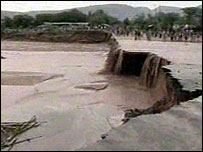 August, 2006 - In the early hours of August 6, a flash flood hit Dire Dawa, Ethiopia’s second largest city, 500 kms east of Addis Ababa.
August, 2006 - In the early hours of August 6, a flash flood hit Dire Dawa, Ethiopia’s second largest city, 500 kms east of Addis Ababa. Close to 500 people died and over 10,000 people were left homeless. The floods swept away houses, vehicles and animals, destroying markets and shops and damaging infrastructure. Many say these were the worst floods in Ethiopia in a long time.
16
Ababa tesfaye fired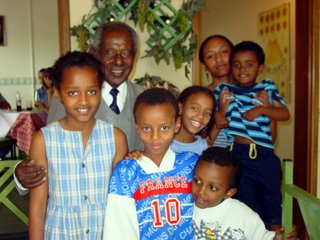 June, 2006 - Ababa Tesfaye, a father figure to most Ethiopians under the age of 40, renowned for his children stories with deep life lessons - was abruptly, with out any explanation, fired from his TV show “Yelijoch Gize”.
June, 2006 - Ababa Tesfaye, a father figure to most Ethiopians under the age of 40, renowned for his children stories with deep life lessons - was abruptly, with out any explanation, fired from his TV show “Yelijoch Gize”. It's a heartbreaking thing," recalls the 84-year-old Ababa Tesfaye. "I have told tales during the imperial government, during the military government's censorship, and during the present government. I keep wondering whether there is anything more I should have done"
Ababa Tesfaye’s removal from his job surprisingly managed, for a brief moment, to unite government apologists and pro-democracy groups which collectively called on the government of Ethiopia to immediately rehire Ababa Tesfaye.
15
The CITIZENS’CHARTER GROUPOctober, 2006 - The CITIZENS’CHARTER GROUP, composed of individuals not affiliated with any political party and comprised of Ethiopians from a variety of ethnic backgrounds release ”the Citizens’ Charter for a Democratic Ethiopia”
The Charter, in the groups own words among other things is “a declaration of principles that ought to guide the country’s political and economic future.”
The charter is awaiting endorsement from opposition parties as well as the EPRDF government.
14
Yalemzewd Bekele, EU personnel arrest in Ethiopia and the drama that ensuedOctober, 2006 - Bjorn JONSSON and Enrico SBORGI European Commission staffers were arrested and expelled by the government of Ethiopia, for allegedly trying to help Yalemzewd Bekele flee the country.
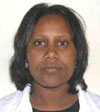 Yalemzewd Bekele, a lawyer working for the European Commission is a prominent civil rights lawyer who volunteered with the Ethiopian Women Lawyers' Association (EWLA), a prominent women's rights organization. She has been an active campaigner for women's rights in Ethiopia.
Yalemzewd Bekele, a lawyer working for the European Commission is a prominent civil rights lawyer who volunteered with the Ethiopian Women Lawyers' Association (EWLA), a prominent women's rights organization. She has been an active campaigner for women's rights in Ethiopia.The European Union condemned the arrest and expulsion of its diplomats from Ethiopia. Amnesty and other human rights organizations demanded the releasese of Yalemzewd. Due to mounting pressure, the government was eventually forced to release Yalemzewd.
13
Tsegaye Gabre-Medhin dies at age 69February, 2006 - IN February of 2006, Ethiopia lost a prolific poet and playwright whom many considered to be one of the most important literary figures the country has produced in the last hundred years.
 Tsegaye Gabre-Medhin was born in the small mountain town of Boda, near Ambo, Ethiopia. Tsegaye graduated from the Blackstone School of Law in Chicago in 1959; by 1960 he had studied experimental theater at the Royal Court Theater in London and the Comédie-Française in Paris.
Tsegaye Gabre-Medhin was born in the small mountain town of Boda, near Ambo, Ethiopia. Tsegaye graduated from the Blackstone School of Law in Chicago in 1959; by 1960 he had studied experimental theater at the Royal Court Theater in London and the Comédie-Française in Paris.Between 1961 and 1971, Tsegaye was artistic director for the Ethiopian National Theater, and in the late 1970's, he founded the department of theater at Addis Ababa University. However, in the 1970s he was imprisoned by the Derg regime, who also banned his writings.
Tsegaye wrote numerous poems, plays, essays, and song lyrics, primarily in Amharic. Many Ethiopians regard him as their Shakespeare. Tsegaye died in Manhattan, where he had moved in 1998 to receive treatment for kidney disease. He was buried in Addis Ababa in the national cathedral where the body of Emperor Haile Selassie lies.
12
HR5680 stalled in CongressSeptember, 2006 – HR 5680 a bill which was to help Ethiopia build strong democratic institutions and help acquire the relese of political prisoners in Ethiopia was stalled in congress by the then speaker of the house Dennis Hastert just as it was about to go for a floor vote.
The bill entitled the “Ethiopia Freedom, Democracy and Human Rights Advancement Act of 2006” is sponsored by Rep. Chris Smith (R) NJ and Donald Payne (D) NJ. It would tie U.S. military and economic aid to Ethiopia’s human rights record and put sanctions on the Ethiopian government unless it releases political prisoners.
Republican lobbyist and former House leader Dick Armey played a major roll in stalling this Human rights bill.
11
The formation of the Alliance for Freedom and Democracy (AFD) and the following controversy May, 2006 – After a controversial, historic meeting by the Coalition for Unity and Democracy Party (CUDP), the Ethiopian People's Patriotic Front (EPPF), the Ogaden National Liberation Front (ONLF), the Oromo Liberation Front (OLF) and the Sidama Liberation Front (SLF), at Utrecht in Netherlands, from 19 to 22 of May 2006 – it was announced that a new alliance was formed by the participating organizations.
May, 2006 – After a controversial, historic meeting by the Coalition for Unity and Democracy Party (CUDP), the Ethiopian People's Patriotic Front (EPPF), the Ogaden National Liberation Front (ONLF), the Oromo Liberation Front (OLF) and the Sidama Liberation Front (SLF), at Utrecht in Netherlands, from 19 to 22 of May 2006 – it was announced that a new alliance was formed by the participating organizations.This news sent shockwaves across the Ethiopian political spectrum for a variety of reason. While some supported the alliance; others noted their reservations and the government of Ethiopia denounced it.
10
The great Ethiopian run, platform for voicing dissatisfaction November 2006 – The Great Ethiopian Run is a competition bringing together people and communities to celebrate the great Ethiopian running tradition.
November 2006 – The Great Ethiopian Run is a competition bringing together people and communities to celebrate the great Ethiopian running tradition.Citizens of Addis who are frustrated by the government’s oppressive policies, turned the annual Great Ethiopian Run into a platform to voice their opposition. Shouts of “Kinijit is back!” and “Give power to the educated!” mingled with slogans denouncing the Somalia invasion were heard echoing from the crowd.
At the time Ethio Zagol (a blogger from Ethiopia) wrote:
“The protest started with the outburst of few people but rapidly grew to engulf thousands. Tension gave way to courage. Songs of opposition, some silly, some funny and some dreary, were sung; anti-Meles and anti-war chants made and the release of political leaders demanded. With the security forces, not reacting, the Great Run ended up being the first peaceful and spontaneous public protest since the election."
9
Government fires auditor general who exposed corruption November 2006 – In 2005 the auditor General of Ethiopia, Lema Aregaw, presented his report to the House of People’s Representatives and officially exposed the deep seated corruption within the EPRDF led government of Ethiopia.
November 2006 – In 2005 the auditor General of Ethiopia, Lema Aregaw, presented his report to the House of People’s Representatives and officially exposed the deep seated corruption within the EPRDF led government of Ethiopia.His report indicated that close to 7.2 Billion Birr (approximately 900 million U.S dollars) was unaccounted for; most of it from the regional states.
In what is seen by most observers as a retaliatory move, the prime minister of Ethiopia in November of 06 removed the auditor general from office.
Mr. Lemma Argaw had served as Auditor General for thirty years. He was appointed in 1979 during the derg era; because of his professional reputation and unpartisan reports, he had managed to hang on to his post for decades.
8
Imprisoned journalist, Serkalem Fasil, gives birth in prisonJune 2006 – Journalist Serkalem Fasil, co-publisher of Asqual and Menilik, currently being tried for "treason" in Ethiopia was Pregnant when arrested and subsequently gave birth in prison in June of 2006.
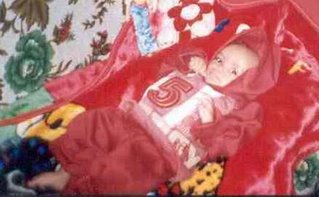 Born prematurely, her son was severely underweight. Doctors advised that he should be put in an incubator in a hospital intensive care unit, but this was blocked by the authorities, who refused to release Sarkalem or her partner from jail to be with their son.
Born prematurely, her son was severely underweight. Doctors advised that he should be put in an incubator in a hospital intensive care unit, but this was blocked by the authorities, who refused to release Sarkalem or her partner from jail to be with their son.The inhuman conditions in which Serkalem gave birth, and the response of a tyrannical government which refused a mother to be with her new born child; is our number 8 pick for story of 2006.
7
Websites critical of the government Blocked in Ethiopia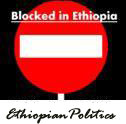 May and November 2006 - In continuation of its repressive policies; the Ethiopian Government blocked all pro-democracy blogs and websites (including ETP) in May of 2006. When this story at the time received attention from the foreign press; the government of Ethiopia backed down - but not for long.
May and November 2006 - In continuation of its repressive policies; the Ethiopian Government blocked all pro-democracy blogs and websites (including ETP) in May of 2006. When this story at the time received attention from the foreign press; the government of Ethiopia backed down - but not for long. In November, the government of Ethiopia intensified its censorship and added to the list of blocked websites and blogs. China is said to be assisting the Ethiopian government in this endeavor. Some Ethiopians living in china have noted that websites blocked in Ethiopia are also inaccessible in China for reasons that are still not clear.
At the moment, all media in Ethiopia is controlled by the government and the free press is in exile.
6
Birtukan Mideksa and Professor Mesfin’s – letters form jailJanuary 2006 – Birtukan Mideksa is a lawyer, former judge and Vice president of the Coalition for Unity and Democracy (CUD).
A strong woman with unbending principles, Birtukan is respected and admired by millions of Ethiopians.
In January of 2006 Birtukan wrote a letter simply titled “Letter from Kaliti Jail” from her jail cell in kality, Ethiopia. This historic document affirmed her and her colleague’s commitment to the struggle for democracy and inspired countless.
Birtukan Writes “I have felt pain when hearing about the struggle of my fellow country men; for being forced to experience it all vicariously, for being near but far away from the terrain of the fight. Yet the pain ends right there. Our incarceration hasn't liquidated the spirit of freedom. Instead, it degrades those who are fighting against it into something hateful and undignified... Talented young writers, passionate about their own freedom, are blogging in the cyber space. The perfidious and loveless treatment of the seekers of freedom and justice is getting the victims more and more resolute. Thinking of that, even within the confinement of my cell, is a pleasant captivity.”
October, 2006 - Professor Mesfin Woldemariam, a world renowned human rights activist also jailed in Kality federal prison, denounced efforts to ethnically divide, in his letter addressed to all Ethiopian citizens.
5
Kinijit Diaspora splitOctober 2006 - After a good deal of internal strife and wrangling kinijit Diaspora officially came apart.
4
Defecting Generals and Judges2006 has been an embarrassing year for EPRDF. Government officials and officers defected in droves.
Some of the defectors include:
-Brig. General Kemal Gelchi , along with 150 of his solders
-General Hailu Gonfa, senior Ethiopian Army commander
-Colonel Gemechu Ayana, Commander of the 8th mechanized force
-Maj. Tesfaye Yemane , senior Ethiopian Army commander
-Addis Abadi Tesfaye , Prime Minister Meles Zenawi's former head of protocol
-Woldemichael Meshesha , Vice President of the Federal First Instance Court
-Ato Mitiku Meshesha, Inquiry commission member
-Firehiwot Samuel, president of the Supreme Court of SNNP
-Teshale Aberra , Oromia region supreme court judge
3
Somali warDecember 2006 – Ethiopians’ distaste for religious fanaticism and foreigners who issue jihad indicts against them, is a well known fact.
Nevertheless, most Ethiopians concur that the EPRDF led government started war with somalia mainly for two reasons;
One - to demonstrate its usefulness to the US , so long as the US turns a blind eye to human rights abuses currently taking place in the country; and second - in anticipation that history will repeat itself and Ethiopians will rally around EPRDF in time of war, as seen in the Ethio-Eritrean conflict - disregarding the 2006 election crises.
How successful will the government be in achieving these goals? 2007 may have the answer.
2
Dr. Berhanu Nega writes “When freedom dawns” August, 2006 - Most of us have heard rumors of how this book was smuggled out of the notorious Kality federal penitentiary. Some accounts rival the adventure and espionage of a Tom Clancy novel.
August, 2006 - Most of us have heard rumors of how this book was smuggled out of the notorious Kality federal penitentiary. Some accounts rival the adventure and espionage of a Tom Clancy novel. Regardless of how it made its escape, Dr. Berhanu’s book has been embraced, read, recited and revered by a majority of Ethiopians as if it were a priceless religious manuscript.
Dr. Berhanu Nega is a professor of economics, former president of the Ethiopian Economic Association and the Ethiopian Economic Policy Research Institute, founding chairman of the Rainbow Ethiopia: Movement for Democracy, Social Justice - and elected mayor of Addis Ababa.
This significant and remarkable book chronicles his and Ethiopia’s journey towards freedom and democracy. It compares and contrasts different ideological and political views from Ethiopia’s perspective, all the while conveying the writer’s eternal optimism.
1
The leaked Inquiry Commission Report
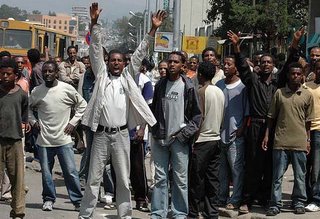
In June and November of 2005, residents of Addis Ababa were gunned down for protesting against the "official" results of the general election, held the same year.
The government said that 58 hooligans were killed while trying to loot and steal. When western donors asked for accountability in this event, the government grudgingly hand picked people to investigate the incident.
The final result was unexpected and astounding to say the least. Everyone had assumed that since the commission was hand picked by the government, it will most likely absolve it of all wrong doing.
Contrary to expectations, the inquiry commission unequivocally stated that the Ethiopian police had massacred 193 protesters in violence and "excessive force" was used by the government.
Video and documents of this report were also smuggled out and released to the free press. Judge Worldemichael meshesha chairman of the inquiry commission told the BBC "The police fired, definitely, as a kind of massacre of the demonstrators - especially in Addis, where more than 160 civilians were dead,"
Click here to see the inquiry commission vote
--------------------------------------------
---------------